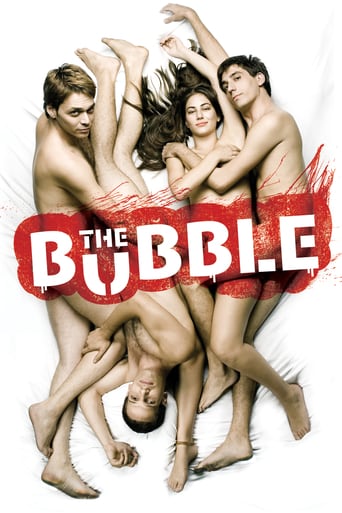

This film tells the love story of a young Israeli soldier and a Palestinian man. Their journey is full of difficulties, as the war breaks out and racial tension mounts."The Bubble" examines what it is like to have a relationship in a society full of racial tensions and people with closed minds. I feel for Ashraf so much, as his family is not accepting towards his sexuality, and also the tragic events that occur in his family towards the end of the film. Fortunately, the film has lighter moments, as the youngsters party their way through the night in the name of peace.The ending few seconds are so powerful that it has a haunting effect on me. Even though "The Bubble" is more of a romantic comedy than a depressing drama, it still will move everyone to tears.
... View MoreAs an Arab, I was really hesitant to watch the movie. Us Jordanians were the second most affect nation of the Palestinian/Israeli conflict due to historical, geographical, and social reasons. After reading so much about the movie, I decided to put my feelings aside, and eventually pressed the play button...I had deep conflicted feelings when the movie ended.. I cried at the tragic end, screamed at the screen "don't do it, you fool!" But the movie is over, and I'm still reeling over it to this second..I'm not gonna talk about the sexuality aspect of the movie, as it is a huge issue for Arabs in general, and Muslims in specific, but I don't believe that was the main idea behind "The Bubble".. The movie tackled the issue of coexistence between Palestinians and Israelis, that many of the people living on the west side of the borders are trying to achieve.. A certain group of young people from both sides are starting to admit that the conflict will not be ending anytime soon, and that hatred and violence will only bring on more hatred and violence, which was the ultimate point to be made at the end of the movie.. As a Muslim, I have to say that I do not in any way accept the methods of Jihadi extremists.. Death is not the answer.. Death only brings more death, and we saw that as the first piece of domino fell, leading to the tragic death of Ashraf and Noam.. It was obvious that the two lovers were facing hard times putting their feelings aside regarding the politics of the country, which was clearly shown after the first bombing took place and Yali lost his ability to walk, causing Noam to stop answering Ashraf's calls.. Then Ashraf's sister was killed "by accident", causing him to stop answering Noam.. The pieces fell one after another until Ashraf decided to make that stupid decision to take his brother-in-law's place in a martyr/suicide mission, leading to his, and Noam's death.. Personally, I think Ashraf only took on this mission because it felt like his only way out.. He didn't do it for political nor religious reasons.. It was merely done because of the depression he felt himself sinking into.. But when he saw Noam towards the end, it was a wakeup call, and he walked away.. He still wanted to press the button because he saw it in Noam's eyes that his lover had realized what he was about to do, and maybe he couldn't take that either... Noam, on the other hand, didn't care.. He knew what was coming, but he still walked out of the shop, and stood so close to Ashraf, as if he didn't want him to go through it alone, ultimately saying that the violence both sides keep causing kills everything, even love..
... View MoreThis film is one of the most perplexing pieces of propaganda ever made. This film despite many of its characters is a pro-occupation film from an ultra liberal hedonist Tel Aviv centric viewpoint. Part of the propaganda designed to paint Israel as a legitimate democracy albeit one with some problems. The latter is not admitted in most of the output of said campaign. This is wear this film succeeds and exceeds beyond all others. We love the characters, I loved the characters it is hard not to. We stand with them in the face of nastier bigoted Israelis. We root for them and we believe we are also rooting for the film and its purpose. Only the film does not reveal its purpose its true vile and disgusting message until the end. A message that is designed manipulate the audience onto the side of the Apartheid bigots.This film came out in 2005/2006 cycle.There were NO suicide bombings in Tel Aviv in 2003 There were NO suicide bombings in Tel Aviv in 2004 There were NO suicide bombings in Tel Aviv in 2005 There were NO suicide bombings in Tel Aviv in 2006 There were NO suicide bombings in Tel Aviv in 2007 There were NO suicide bombings in Tel Aviv in 2008 There were NO suicide bombings in Tel Aviv in 2009 There were NO suicide bombings in Tel Aviv in 2010.The idea that a sensitive and enlightened educated young Palestinian secular gay man would turn suicide bomber on a dime is total bull and a disgusting piece of bigotry.
... View MoreThis film is a complete re-imagining of Romeo and Juliet in Tel Aviv and Nablus. The lovers are one from Tel Aviv et the other from Nablus. There is a border between them, and a constant state of war with the Israeli army ever present everywhere and the Palestinian militants everywhere else with their bombs. The situation is bleak enough. We can imagine love in that enormous loveless trap. But the film goes several light years further by imagining the two lovers are gay, Noam from Tel Aviv and Ashraf from Nablus. To be gay is accepted in Tel Aviv. It is off limits in Nablus. The conflict between the two peoples, the two communities is thus doubled with a conflict between two cultures, two ethics. But this could even be livable if the war did not bring some extra dimension. Ashraf's sister is going to get married to a militant activist in Nablus. Ashraf finally tells his sister about his being gay. She cannot accept it but accepts to speak about it later. From the wedding itself the newly married husband sends a commando into Tel Aviv to set up a bomb attack. It takes place in a café in Tel Aviv and one friend of Noam's is severely wounded. Bad enough. The Isareli army sends a commando to Nablus to arrest the person responsible for this attack, but it turns sour and the newly married wife is shot dead in the street. The funeral follows the wedding. The husband and widower volunteers for a suicide bomb attack. Ashraf volunteers to take his place. The exiled lover comes back to Tel Aviv to die and kill a few people to avenge his sister. He arrives at a diner managed by some friends of Noam's. But Noam sees him and gets out to speak to him. Ashraf has moved back to the middle of the street and he detonates his bomb when Noam reaches him in the street. The vengeance reunites the two lovers in death. We thus have the dual conflict but we do not have the Prince of Verona, a neutral character that can impose peace, or even worse the Prince seems to have chosen sides and to be on the side of Israel. The game is entirely false and death is sure on both sides. But the dimension of impossible love is all the stronger because it is redoubled by a play in the film, a play that shows love in Auschwitz, between two prisoners, one wearing a yellow star and the other a pink triangle. This is both strikingly strong and breathtakingly shocking: gay love in Auschwitz. What comes out of the film is that over there in Tel Aviv or Nablus love is impossible. The film is thus a denunciation of the conflict in Palestine that cannot but continue though it has no reason to even exist though it has thousands of reasons to go on. We should never have let Great Britain deal with the region a long time ago. Today we have to find a solution in which no one will be humiliated. This will only be able to succeed if everyone comes together in order to find a lasting solution. But so far everyone is trying to avoid that general confrontation and discussion preferring bilateral manipulations. So suffering will go on and love will be forbidden, of course not sex since children are needed for the war to go on: so let's procreate more and more little soldiers. But love is just an extra-terrestrial concept.Dr Jacques COULARDEAU, University Paris Dauphine & University Paris 1 Pantheon Sorbonne
... View More